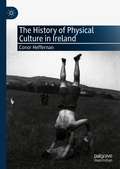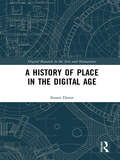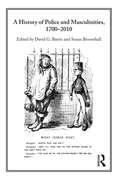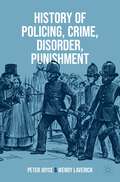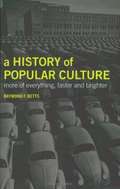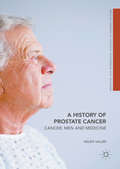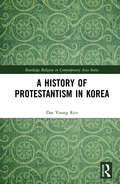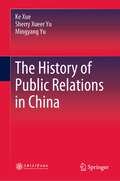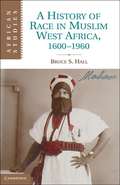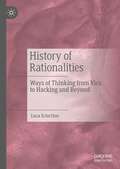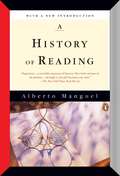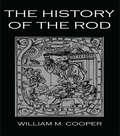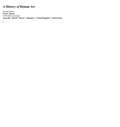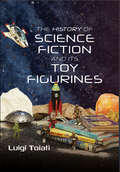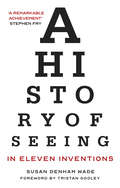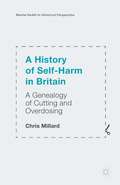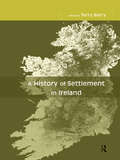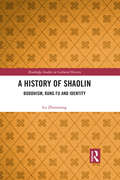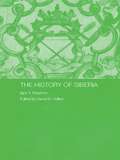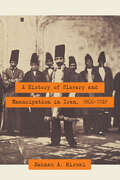- Table View
- List View
The History of Physical Culture in Ireland
by Conor HeffernanThis book is the first to deal with physical culture in an Irish context, covering educational, martial and recreational histories. Deemed by many to be a precursor to the modern interest in health and gym cultures, physical culture was a late nineteenth and early twentieth century interest in personal health which spanned national and transnational histories. It encompassed gymnasiums, homes, classrooms, depots and military barracks. Prior to this work, physical culture’s emergence in Ireland has not received thorough academic attention. Addressing issues of gender, childhood, nationalism, and commerce, this book is unique within an Irish context in studying an Irish manifestation of a global phenomenon. Tracing four decades of Irish history, the work also examines the influence of foreign fitness entrepreneurs in Ireland and contrasts them with their Irish counterparts.
A History of Place in the Digital Age (Digital Research in the Arts and Humanities)
by Stuart DunnA History of Place in the Digital Age explores the history and impact of Geographic Information Systems (GIS) and related digital mapping technologies in humanities research. Providing a historical and methodological discussion of place in the most important primary materials which make up the human record, including text and artefacts, the book explains how these materials frame, form and communicate location in the age of the internet. This leads in to a discussion of how the World Wide Web distorts and skews place, amplifying some voices and reducing others. Drawing on several connected case studies from the early modern period to the present day, the spatial writings of early modern antiquarians are explored, as are the roots of approaches to place in archaeology and philosophy. This forms the basis for a review of place online, through the complex history of the invention of the internet, in to the age of the interactive web and social media. By doing so, the book explores the key themes of spatial power and representation which these technologies frame. A History of Place in the Digital Age will be of interest to scholars, students and practitioners in a variety of humanities disciplines with an interest in understanding how technology can help them undertake research on spatial themes. It will be of interest as primary work to historians of technology, media and communications.
A History of Police and Masculinities, 1700-2010
by David G. Barrie Susan BroomhallThis unique collection brings together leading international scholars to explore how ideologies about masculinities have shaped police culture, policy and institutional organization from the eighteenth century to the present day. It addresses an under-researched area of historical inquiry, providing the first in-depth study of how gender ideologies have shaped law enforcement and civic governance under ‘old’ and ‘new’ police models, tracing links, continuities, and changes between them. The book opens up scholarly understanding of the ways in which policing reflected, sustained, embodied and enforced ideas of masculinities in historic and modern contexts, as well as how conceptions of masculinities were, and continue to be, interpreted through representations of the police in various forms of print and popular culture. The research covers the UK, Europe, Australia and America and explores police typologies in different international and institutional contexts, using varied approaches, sources and interpretive frameworks drawn from historical and criminological traditions. This book will be essential reading for academics, students and those in interested in gender, culture, police and criminal justice history as well as police practitioners.
History of Policing, Crime, Disorder, Punishment
by Peter Joyce Wendy LaverickThis engaging textbook provides a broad and unique coverage of the key historical events that shaped ideas in criminology, criminal justice and policing from the late seventeenth century to the early twenty-first century in England and Wales. It vividly illustrates the multi-disciplinary nature of criminology and penology by providing important insights into the social and political issues that shaped the development and operations of the criminal justice system and its responses to both crime and disorder. Using key text boxes, this book highlights key people, theorists, foundational principles and events throughout. Part One discusses the nature of crime and forms of punishment between 1689 and 1750 and the penological concerns regarding the aims of punishment. Part Two focuses on crime and disorder between 1750 and 1850, examining the impact of urbanization on criminal activity and it considers the background and state responses to key episodes of public disorder. Part Three covers the development of policing 1689-1856 and the contribution to policing made by reformers and the implementation of police reform. Part Four deals with a number of issues affecting crime and punishment between 1850 and 1920 including episodes such as Irish Home Rule within the context of ‘high policing’. It evaluates changes to the nature and role of prisons that occurred in this period. This student-friendly book contains end of chapter questions which summarise and enable further discussion.
A History of Popular Culture: More of Everything, Faster, and Brighter
by Raymond F. BettsThis lively and informative survey provides a thematic global history of popular culture focusing on the period since the end of the Second World War. Raymond Betts considers the rapid diffusion and "hybridization" of popular culture as the result of three conditions of the world since the end of World War Two: instantaneous communications, widespread consumption in a market-based economy and the visualization of reality. Betts considers the dominance of American entertainment media and habits of consumption, assessing adaptation and negative reactions to this influence. The author surveys a wide range of topics, including the effects of global conflict, the effects of urbanization and the growth of sport as a commercial enterprise.
A History of Prejudice
by Gyanendra PandeyThis is a book about prejudice and democracy, and the prejudice of democracy. In comparing the historical struggles of two geographically disparate populations - Indian Dalits (once known as Untouchables) and African Americans - Gyanendra Pandey, the leading subaltern historian, examines the multiple dimensions of prejudice in two of the world's leading democracies. The juxtaposition of two very different locations and histories, and within each of them of varying public and private narratives of struggle, allows for an uncommon analysis of the limits of citizenship in modern societies and states. Pandey, with his characteristic delicacy, probes the histories of his protagonists to uncover a shadowy world where intolerance and discrimination are part of both public and private lives. This unusual and sobering book is revelatory in its exploration of the contradictory history of promise and denial that is common to the official narratives of nations such as India and the United States and the ideologies of many opposition movements.
A History of Prostate Cancer: Cancer, Men and Medicine (Medicine and Biomedical Sciences in Modern History)
by Helen ValierThis book offers a comprehensive and inclusive insight into the history of prostate cancer and its sufferers. Until recently, little practical help could be offered for men afflicted with the devastating diseases of the genitourinary organs. This is despite complaints of painful urination from aging men being found in ancient medical manuscripts, despite the anatomical discoveries of the European Renaissance and despite the experimental surgical researches of the eighteen and nineteenth centuries. As diseases of the prostate, including prostate cancer, came to be better understood in the early twentieth century, therapeutic nihilism continued as curative radical surgeries and radiotherapy failed. The therapeutic 'turn' came with hormonal therapies, itself a product of the explosive growth of U. S. biomedicine from the 1940s onwards. By the 1990s, prostate cancer screening had become a somewhat ubiquitous but controversial feature of the medical encounter for American men as they aged, which greatly influenced the treatment pathways and identity of the male patient: as victim, as hero, and ultimately, as consumer.
A History of Protestantism in Korea (Routledge Religion in Contemporary Asia Series)
by Dae Young RyuThis book provides a comprehensive overview of Protestant Christianity in Korea. It outlines the development of Christianity in Korea before Protestantism, considers the introduction of Protestantism in the late nineteenth century and its widening and profound impact, and goes on to discuss the situation up to the present. Throughout the book emphasises the importance of Protestantism for Korean national life, highlights the key role Protestantism has played in Korea’s social, political, and cultural development, including in North Korea whose first leader Kim Il Sung was the son of devout Protestant parents, and demonstrates how Protestantism continues to be a vital force for Korean society overall.
The History of Public Relations in China
by Ke Xue Sherry Xueer Yu Mingyang YuThis book is the first on the history of Chinese public relations, and has been selected as one of the “40 representative books for 40 years of public relations in China” by the Public Relations Society of China. In four chapters, it systematically reviews and analyzes the trajectory and evolution of public relations in China from the very start – when the “reform and opening” policy was adopted in 1978 – to the present.The book will help both established and new scholars and practitioners in the field to understand the changing nature of public relations in China. It offers a unique perspective by placing the discussion of the development of public relations in the general context of the changes and development of China as a whole, and in relation to the changing status of public relations around the world. Accordingly, readers will not only gain a more in-depth understanding of the history of the field, but also of the political, economic, societal, cultural and scientific development of China in modern times.
A History of Race in Muslim West Africa, 1600–1960
by Bruce S. HallThe mobilization of local ideas about racial difference has been important in generating, and intensifying, civil wars that have occurred since the end of colonial rule in all of the countries that straddle the southern edge of the Sahara Desert. From Sudan to Mauritania, the racial categories deployed in contemporary conflicts often hearken back to an older history in which blackness could be equated with slavery and non-blackness with predatory and uncivilized banditry. This book traces the development of arguments about race over a period of more than 350 years in one important place along the southern edge of the Sahara Desert: the Niger Bend in northern Mali. Using Arabic documents held in Timbuktu, as well as local colonial sources in French and oral interviews, Bruce S. Hall reconstructs an African intellectual history of race that long predated colonial conquest, and which has continued to orient inter-African relations ever since.
History of Rationalities: Ways of Thinking from Vico to Hacking and Beyond
by Luca SciortinoOver time, philosophers and historians of science have introduced different notions of 'ways of thinking'. This book presents, compares, and contrasts these different notions. It focuses primarily on Ian Hacking’s idea of 'style of reasoning' in order to assess and develop it into a more systematic theory of scientific thought, arguing that Hacking’s theory implies epistemic relativism. Luca Sciortino also discusses the implications of Hacking’s ideas for the study of the problem of contingency and inevitability in the development of scientific knowledge
A History of Reading
by Alberto ManguelA History of Reading is a wonderful celebration of the one invention that has done most for the human race. From clay tablets to CD-ROM, from book thieves to book burners, bibliophiles, book fools and saints, noted essayist Alberto Manguel follows the quirky and passionate 4000-year-old history of the written word whose true hero is the reader. For those who love reading, this, at long last, is their story.
A History of Reading
by Alberto ManguelAt one magical instant in your early childhood, the page of a book--that string of confused, alien ciphers--shivered into meaning. Words spoke to you, gave up their secrets; at that moment, whole universes opened. You became, irrevocably, a reader. Noted essayist Alberto Manguel moves from this essential moment to explore the 6000-year-old conversation between words and that magician without whom the book would be a lifeless object: the reader. Manguel lingers over reading as seduction, as rebellion, as obsession, and goes on to trace the never-before-told story of the reader's progress from clay tablet to scroll, codex to CD-ROM.
A History of Reading
by Alberto ManguelAt one magical instant in your early childhood, the page of a book--that string of confused, alien ciphers--shivered into meaning, and at that moment, whole universes opened. You became, irrevocably, a reader. Noted essayist and editor Alberto Manguel moves from this essential moment to explore the six-thousand-year-old conversation between words and that hero without whom the book would be a lifeless object: the reader. Manguel brilliantly covers reading as seduction, as rebellion, and as obsession and goes on to trace the quirky and fascinating history of the reader's progress from clay tablet to scroll, codex to CD-ROM.
A History of Regional Commercial Television in Australia
by Michael ThurlowThis book is the first history of commercial television in regional Australia, where diverse communities are spread across vast distances and multiple time zones. The first station, GLV Latrobe Valley, began broadcasting in December 1961. By the late 1970s, there were 35 independent commercial stations throughout regional Australia, from Cairns in the far north-east to Bunbury in the far south-west. Based on fine-grained archival research and extensive interviews, the book examines the key political, regulatory, economic, technological, industrial, and social developments which have shaped the industry over the past 60 years. Regional television is often dismissed as a mere extension of – or footnote to – the development of Australia’s three metropolitan commercial television networks. Michael Thurlow’s study reveals an industry which, at its peak, was at the economic and social heart of regional communities, employing thousands of people and providing vital programming for viewers in provincial cities and small towns across Australia.
History Of The Rod: A History Of The Rod In All Countries From The Earliest Period To The Present Time
by CooperFirst published in 2005. Routledge is an imprint of Taylor & Francis, an informa company.
A History Of Roman Art (Mindtap Course List Ser.)
by Fred S. KleinerA HISTORY OF ROMAN ART, 2nd Edition, surveys the art of Rome and its empire from the time of Romulus to the death of Constantine presented in its historical, political, and social context, with coverage of Etruscan and Greek art in Italy before the rise of Rome and of Christian art and architecture during the Late Empire. Each of the 21 chapters combines a discussion of general issues and individual monuments with a series of boxed essays on architectural terminology; materials and techniques; religion and mythology; the cultural context of works of art; the role of patrons in determining the character of Roman monuments; and the problems that ancient artists and architects faced and how they solved them.
The History of Science Fiction and Its Toy Figurines
by Luigi Toiati"This eye-opening book deserves a spot on the bookshelves of anyone who not only enjoys collecting, but also has a great interest in all facets of the history of our hobby." — Toy Soldier Collector Science fiction, as the name suggests, is the combination of science and fantasy. In addition to a literary form, it also encompasses film, TV, comics, toys and our beloved toy astronauts, or other figures such as aliens, monsters and other playable genres. The term science fiction was coined by publisher Hugo Gernsbach around the first decades of the last century to refer to the predominantly 'space' adventures covered in his magazines. Space invaded radio, cinema, TV, and consequently for a long time toy figurines were predominantly space-related, later evolving into other themes. This lavishly illustrated book covers both the history of literary science fiction, following in the footsteps of contemporary official criticism, and toy figurines inspired by science fiction. You will also find several other themes, such as the link between science fiction figures and cinema, radio, TV, comics, and more. Luigi Toiati offers to both guide the reader on an often-nostalgic walk through science fiction in all its various forms, and to describe the figurines and brands associated with it.
A History of Seeing in Eleven Inventions: A History of Seeing
by Susan Denham Wade Tristan Gooley'A remarkable achievement' - Stephen FryIn 2015 #thedress captured the world’s imagination. Was the dress in the picture white and gold or blue and black? It inspired the author to ask: if people in the same time and place can see the same thing differently, how did people in distant times and places see the world?Jam-packed with fascinating stories, facts and insights and impeccably researched, A History of Seeing in Eleven Inventions investigates the story of seeing from the evolution of eyes 500 million years ago to the present day. Time after time, it reveals, inventions that changed how people saw the world ended up changing it altogether.Twenty-first-century life is more visual than ever, and seeing overwhelmingly dominates our senses.Can our eyes keep up with technology? Have we gone as far as the eye can see?
A History of Self-Harm in Britain: A Genealogy of Cutting and Overdosing (Mental Health in Historical Perspective)
by Chris MillardThis book is open access under a CC BY license and charts the rise and fall of various self-harming behaviours in twentieth-century Britain. It puts self-cutting and overdosing into historical perspective, linking them to the huge changes that occur in mental and physical healthcare, social work and wider politics.
A History of Settlement in Ireland
by Terry BarryA History of Settlement in Ireland provides a stimulating and thought-provoking overview of the settlement history of Ireland from prehistory to the present day. Particular attention is paid to the issues of settlement change and distribution within the contexts of:* environment* demography* culture.The collection goes further by setting the agenda for future research in this rapidly expanding area of academic interest.This volume will be essential reading for all those with an interest in the archaeology, history and social geography of Ireland.
A History of Shaolin: Buddhism, Kung Fu and Identity (Routledge Studies in Cultural History #70)
by Lu ZhouxiangShaolin Monastery at Mount Song is considered the epicentre of the Chan school of Buddhism. It is also well known for its martial arts tradition and has long been regarded as a special cultural heritage site and an important symbol of the Chinese nation. This book is the first scholarly work in English to comprehensively examine the full history of Shaolin Monastery from 496 to 2016. More importantly, it offers a clear grasp of the origins and development of Chan Buddhism through an examination of Shaolin, and highlights the role of Shaolin and Shaolin kung fu in the construction of a national identity among the Chinese people in the past two centuries.
A History of Shaolin: Buddhism, Kung Fu and Identity (Routledge Studies in Cultural History #70)
by Lu ZhouxiangShaolin Monastery at Mount Song is considered the epicentre of the Chan school of Buddhism. It is also well known for its martial arts tradition and has long been regarded as a special cultural heritage site and an important symbol of the Chinese nation. This book is the first scholarly work in English to comprehensively examine the full history of Shaolin Monastery from 496 to 2016. More importantly, it offers a clear grasp of the origins and development of Chan Buddhism through an examination of Shaolin, and highlights the role of Shaolin and Shaolin kung fu in the construction of a national identity among the Chinese people in the past two centuries.
The History of Siberia (Routledge Studies in the History of Russia and Eastern Europe)
by Igor V. NaumovSiberia has had an interesting history, quite distinct from that of Russia. Absolutely vast, containing many non-Russian nationalities, and increasingly important at present because of its huge energy reserves, Siberia was at one time part of the Mongol Empire, was settled relatively late by the Russians, and was for a long period a wild frontier zone, similar to the American West. Providing a comprehensive history of Siberia from the very earliest times to the present, this book covers every period of Siberia's history in an accessible way.
A History of Slavery and Emancipation in Iran, 1800–1929
by Behnaz A. MirzaiThe first history of slavery in this key Middle Eastern country and how it shaped the nation&’s unique character.Slavery in the Middle East is a growing field of study, but the history of slavery in a key country, Iran, has never before been written. This history extends to Africa in the west and India in the east, to Russia and Turkmenistan in the north, and to the Arab states in the south. As the slave trade between Iran and these regions shifted over time, it transformed the nation and helped forge its unique culture and identity. Thus, a history of Iranian slavery is crucial to understanding the character of the modern nation.Drawing on extensive archival research in Iran, Tanzania, England, and France, as well as fieldwork and interviews in Iran, Behnaz A. Mirzai offers the first history of slavery in modern Iran from the early nineteenth century to emancipation in the mid-twentieth century. She investigates how foreign military incursion, frontier insecurity, political instability, and economic crisis altered the patterns of enslavement, as well as the ethnicity of the slaves themselves. Mirzai&’s interdisciplinary analysis illuminates the complex issues surrounding the history of the slave trade and the process of emancipation in Iran, while also giving voice to social groups that have never been studied: enslaved Africans and Iranians. Her research builds a clear case that the trade in slaves was inexorably linked to the authority of the state. During periods of greater decentralization, slave trading increased, while periods of greater governmental autonomy saw more freedom and peace.&“This is a major contribution to the study of enslavement in Iran, which will doubtlessly become a must-read for any future studies of Middle Eastern and Islamic enslavement and abolition, as well as for any work on Iranian history in general.&” —Ehud R. Toledano, Tel Aviv University, author of As If Silent and Absent: Bonds of Enslavement in the Islamic Middle East&“While this book will be revelatory to scholars of Iran, it also promises to engage with theoretical trends in the study of slavery elsewhere. It frames many research questions broadly to engage with scholars of slavery in other Muslim lands, as well as slavery elsewhere.&” —Kamran Scot Aghaie, University of Texas at Austin, coeditor of Rethinking Iranian Nationalism and Modernity
